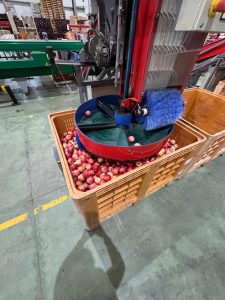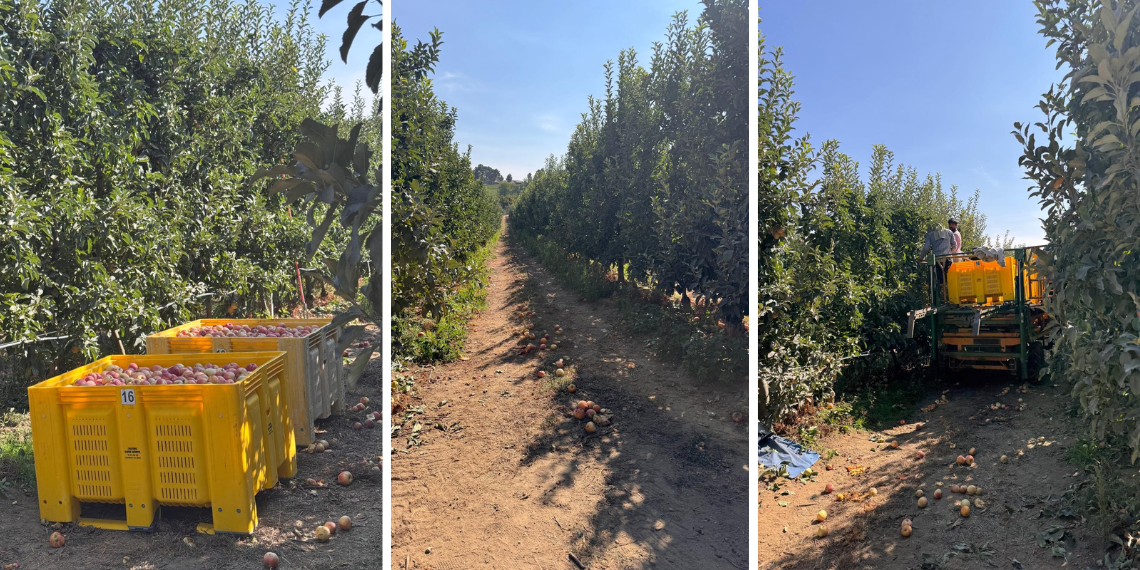Focusing on digital tools for planning and logistics, the project aims to stand out by supporting producers across different stages, e.g., harvesting, transportation and storage of apples.
The CIDERWISE project is proof that sharing ideas – supported by different outlooks – can indeed bear fruit; in this case, apples. During a presentation in Arruada dos Vinhos (precisely on the future of the apple value chain), Reinaldo Gomes, INESC TEC researcher, had the opportunity to listen to several producers on the topic. Also present was Catarina Marques Gomes, a researcher at the University of Trás-os-Montes and Alto Douro (UTAD), who “quickly identified the enormous potential in recovering discarded apples”, recalled the researcher.
Given that a significant share of national apple production is currently wasted or undervalued, the foundations for CIDERWISE were set.
With the goal of “finding technological and organisational solutions that transform apple waste into a resource with economic, environmental and social value”, the project aims to distinguish itself from other approaches by considering “integration with digital planning and logistics models”. What does this mean in practice? It means optimising the “collection, transportation and storage of discarded apples”, by linking “technological valorisation with decision-support tools that make the recovery chain more efficient and sustainable”.
According to Reinaldo Gomes, “there is a growing number of studies on using residues for cider, vinegar, bioactive compounds and functional ingredients”. However, they share a common limitation: a predominant focus on technological and laboratory-based aspects.
Through a “multidisciplinary and systemic approach”, CIDERWISE – a project that also involves UTAD researcher Alice Vilela – aims to do things differently. This includes processes for adding value to discarded apples, such as producing ciders and other fermented products with higher added value. The logistics planning models and digital flow-management systems, which will enable the optimisation of apple collection and transportation – together with dynamic decision-support tools – will be crucial for producers when it comes to “planning their operations more effectively and reducing losses”.
“The state of decomposition of discarded apples has a decisive impact on the final quality of the fermented product. Therefore, rigorous planning of harvesting, transportation and storage is essential to ensure the quality and safety of the process”, as mentioned by Reinaldo Gomes. By proposing the development of a “dynamic digital tool” capable of supporting producers’ decisions and improving the management of the entire discarded-apple flow, the project sets itself apart, offering a truly “orchard-to-processing” approach.

Cumulatively, the project is expected to generate scientific, economic and environmental impact. At the top of the list of expected outcomes is, naturally, a reduction in apple waste, driven by the creation of “new valorisation channels”. These channels will be supported by a “decision-support system” that increases efficiency and transparency across the value and transportation chain. At the same time, the creation of “innovative and sustainable products”, such as high-quality ciders and vinegars, will provide producers with additional viable market opportunities.
But the INESC TEC researcher does not intend to stop there. While CIDERWISE allows him to “apply the know-how” gained in the forestry and bioeconomy sectors to the apple value chain, another of his objectives is to “demonstrate the transferability of the solutions developed to other agro-food sectors facing similar challenges”. Supported by “scientific and technological knowledge” – through publications, training activities and new collaborations between academia and industry – the project ultimately aims to “strengthen the competitiveness of the sector and contribute to a more circular and sustainable economy”.
As a project partner, INESC TEC will play a “central role” in the digital and planning components, “being responsible for developing the decision-support system that will allow producers to monitor, in real time, the volumes of discarded apples, plan harvesting, and optimise transportation and delivery to different valorisation destinations”. More specifically, and according to the researcher, this will involve “logistics modelling and optimisation”, “algorithm and digital-tool development”, and the “integration of digital models”. These “intelligent planning and optimisation tools can be scaled and adapted to new production contexts”, he concluded.
The researcher mentioned in this news piece is associated with INESC TEC.


 News, current topics, curiosities and so much more about INESC TEC and its community!
News, current topics, curiosities and so much more about INESC TEC and its community!